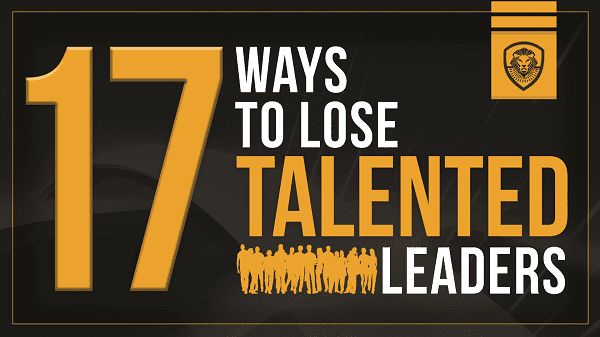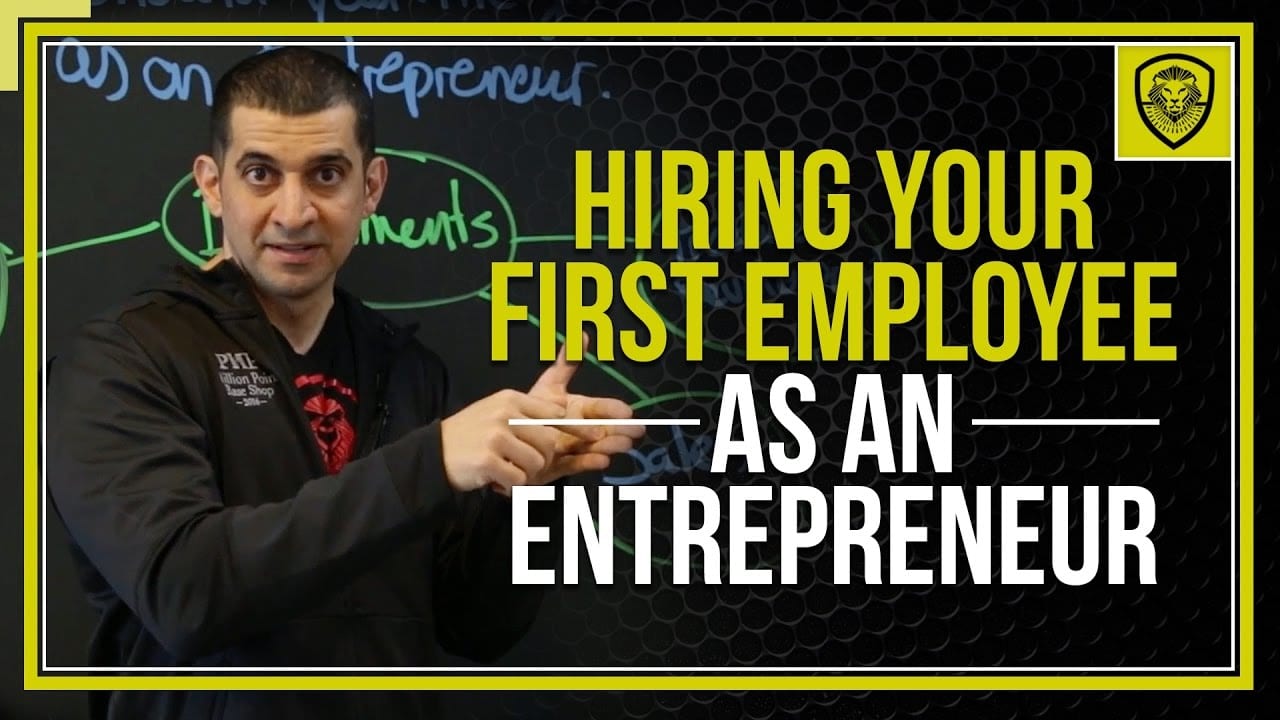If I were to ask you what is the most important asset as you’re trying to build your business, what would you say? Most people answer, “money.” But I’m here to tell you that it’s not money, it’s social capital. It’s talented leaders.
In the video below I cover the 17 different ways you can lose talented leaders in your organization.
17 Ways to Lose Talented Leaders
#1: Box People into a Job Description – 00:53
I recently brought a new executive on board. In the interview, he was very timid. When I asked him why he was so timid, I found that in his previous positions, he seldom saw the CEO.
I told him that we’re an actively involved company. But I told him that one of the reasons I brought him on board was because of his experience and incredible resume. I explained that I brought him on board because I want him to give us ideas. I want him to ask if we’ve thought about doing various things. I explained that he has the job description because we had to give him a title, but I explained to him to forget about the title for a moment; if he has things that he thinks we can do better, I want him to come to me. I want his feedback. I don’t want him to think that he’s in a box.
If you bring a talented leader on board, they already have a strong background and likely have had some success, but they’re looking for a place they can call home, a place where they can really use their talent. They like organizations that are bigger than them.
But you can’t box a talented leader in one little place and say, “this is all you can do.” Instead, ask, “what else do you think we can do?”
#2: Expecting Too Much, Too Soon – 03:45
When you bring a talented leader on board, expect it to take 30-90 days for them to scope things out and see where they fit.
In the first 90 days, I expect people to learn our system, language, culture, and what we have going on. I want to learn from them what they think we can improve, and my only expectation is for them to figure out how to make things better, how to make us a stronger organization and how to improve the department they work in.
That’s the expectation for the first 30-90 days. Then the expectation goes higher on what we want them to do. There are seasons for the expectation to be higher and lower.
We had a staff meeting this morning and it wasn’t the most motivational meeting. We sat down and had a very direct conversation for certain areas at the home office that I expect to improve. It was a high expectation, but everybody is a veteran that would have expected this conversation to come up. I don’t expect newer leaders to perform at that same level.
#3 Expecting Too Little – 05:19
Talented leaders aren’t working just to get a salary. They can go work anywhere. They want to do things that push the envelope, do something that has never been done before, that will make an impact.
They’re almost surprised if they’re not being called out, if there’s not a high expectation, and a desire to beat our prior best numbers or do something that we’ve never done before. They expect us to want to build the best.
Talented leaders thrive with challenges, and you’ll lose them if the expectation is too low.
[infobox maintitle=”Recommended for You” subtitle=”How to Identify and Drive the Leaders of Your Team” bg=”gray” color=”black” opacity=”off” space=”30″ link=”http://patrickbetdavid.kinsta.cloud/how-to-identify-and-drive-the-leaders-of-your-team/”]
#4: Breaking Your Promises – 06:11
If you don’t keep your promises, people won’t take you seriously as a leader — especially if there’s a trend of broken promises. if you say you’re going to do things and then they never happen, you’ll lose talented leaders.
#5: Promoting the Wrong People – 06:28
When you promote and build up the wrong people, leaders see between the lines, and it is obvious to them if you’re promoting people who really shouldn’t be promoted.
Before you say, “That’s why I’m leaving my company!” ask yourself, “Are you just a talented person that’s not willing to improve, or are you a talented leader?” Because maybe someone got the promotion over you because you have talent, but you’re not willing to lead.
But when you give credit to the person that’s not setting the best example, that isn’t willing to work hard, if you play favorites, your top talent will sense it, and they’ll realize that they won’t get credit for the contribution they make and you’ll lose them.
#6: Failure to Get Rid of Or Break Ties with People that Deserve to Get Fired – 07:34
If someone doesn’t fit in with the culture of the organization and you don’t fire them early, you will have a problem with talented leaders.
We give everyone a shot, but if I have someone that comes on board and we see that there just isn’t a fit for them to work with us, we will very quickly fire that person and move on. We do this not only for our sake, but very importantly for their sake as well. Because if a person doesn’t fit with the vision you have, you shouldn’t be afraid to fire them.
You don’t need to be hesitant to let the wrong people go. You’re looking for leaders in the people you’re hiring. So get rid of people who don’t fit.
#7: Failure to Give Credit Where Credit is Due – 08:31
If someone did something and they’re the reason why there was some form of success, give them credit. If they are the reason something incredibly good happened with the company, give them credit, as quickly as possible.
Sometimes, recognition is what people really want. If someone did something and because of it the company is experiencing some success, give them credit rather than taking credit for the success yourself.
For many talented leaders, it’s not just about the dollar amount they are paid; it’s about the contribution they’re making to the organization.
[infobox maintitle=”Recommended for You” subtitle=”How Leaders Annoy Their Team” bg=”gray” color=”black” opacity=”off” space=”30″ link=”http://patrickbetdavid.kinsta.cloud/how-leaders-annoy-their-team/”]
#8: Not Showing You Genuinely Care – 09:14
At the end of the day, the leaders in your organization are human beings and you have to show that you care about them. Not everyone will be your best friend in the world, or become like a brother to you, but people are human beings and when you’re building a team, people want to know that you care about them.
#9: Never Admitting You Are Wrong – 09:34
If you’re wrong, just come out and say, “I was wrong. This was my fault. I made a mistake. I’m going to get better. I apologize, let’s move on.” People will thank you for doing that, and see that you’re the bigger person, and someone they’re willing to follow.
That small conversation of, “I made a mistake, I was wrong, I apologize” saves so much drama and can keep you from losing talented leaders that will help your organization move to the next level.
#10: You Not Being Predictable – 10:04
Talented leaders want to work with other talented leaders that are very predictable when it comes to what time they show up to work, what they do on a day-to-day basis, their habits, attitude, personality, and highs and lows.
I got a call the other day from someone that I’m advising. He runs a very successful company. They just recently raised $35M and he gave me a call and told me that some really strange things were happening.
They were starting to hire some engineers that were 10 times better than him. He wondered what to do about that.
I explained to him that those people aren’t looking to him to have all the answers. They don’t expect him to know everything. Phil Jackson doesn’t coach Jordan and Kobe because he’s better at playing the game than they are. They just want to know that you’re a leader and that you’re in it with them. They don’t expect you to have all the answers. But they want to make sure you’re a predictable leader who will show up every day to build this monstrosity that you want to build. As long as you do that, you have their respect.
#11: Not Setting a Great Personal Example — Having Character Issues – 11:36
This month’s book of the month that we read, had to do with ethics, it had to do with doing the right things, and it’s a constant reminder that when you’re a leader, everyone is watching your example.
If you’re a CEO, everyone is watching your habits and what you’re doing. They’re watching you more closely than you think they are. They’re watching every single move you make, and characters issues are not hard to see. You may lose a talented leader and not know why, until years later when you realize that it was a character issue that caused you to lose them.
#12: No Vision -12:23
If you don’t have a vision of the next step, and where the company’s going, you’ll lose talented leaders.
They need to have something bigger that they’re going after with you.
Everyone knows when a vision is real. If someone makes up a vision, they’ll only talk about it for a month or two and it never comes up again. If someone truly has a vision, they bleed it all the time.
You have to have a clear vision of where you’re going to maintain those people who are also big thinkers and talented leaders.
#13: Not Allowing Them to Make Mistakes – 13:03
A workplace environment that is like walking on eggshells is a very annoying environment to be in.
I’m all for mistakes. I don’t have a problem with mistakes. I have problems with old mistakes, but I don’t have a problem with new mistakes.
New mistakes are, “We tried something and it didn’t work.” That’s totally fine; it didn’t work, let’s move on.
Old mistakes are, “We’ve already tried this three other times and it didn’t work, why are we doing it again?” That’s not OK. But I don’t have a problem with new mistakes.
#14: Not Being Hands on and Aware of What is Going on on a Daily Basis – 14:11
We’ve all had experience with the following two types of people. I’ll call them Joey and Bobby. Joey is a very talented leader and could be someone who would be great long term for your business or organization.
But Joey is working with Bobby, and Bobby is sloppy. He shows up every once in a while, is a very demanding boss, who doesn’t do things himself and isn’t at work every day, but wants to tell everyone else what to do.
Naturally, Bobby never tells you about Joey, so you don’t know that Joey is the one that makes Bobby look good.
The only way that you’ll find out that Joey is the one doing the work is if you’re a hands on leader and if you’re interacting with the people in your company.
All you have to do is go visit a site or office and you’ll generally see that everyone in the office is talking about Joey. Then you’ll find out that Joey is behind the success. If you didn’t spent time with the people who work for you, you’d never find out who the real leader is.
This happens to me all the time when I do site visits. I’ll realize who it is who is really making things happen. Then I know what I’m dealing with myself.
This is important because the value of a great organization is based on the value of the true leaders such as Joey, but unless you as the leader of the organization are aware of what’s happening, you’ll lose those leaders to another organization.
#15: Measuring Hours Instead of Results – 15:40
We have a place here where you clock in with your fingerprint. We’ve had this for five years now. If you ask me how many times I’ve actually seen a report of what time people sign in, the answer is ZERO. I have no idea. I’ve never seen it. I’ve never had the conversation with team members about them coming in late. But I have had the conversation with people who have said they would get something done by a particular time and don’t. I look more at the commitment the people make, and whether or not they are true to their commitments, than the actual hours they work.
Talented leaders are constantly taking initiative and generally don’t like to be micromanaged by someone. They instead want to show you what they have going on. They don’t mind being held accountable. In fact, they have no problem with it, based on the results of what they do, not on the hours they put in.
#16: No Clear Direction – 17:13
Talented leaders want you to give them clear direction. They want to know your expectations, and what your priorities are.
I sat down some of our leaders and said, “Your focus is this, and here’s what we need from you.” The more clarity there is for everyone, the better the odds that they’ll hit the target.
#17: They’re Not Being Challenged – 17:49
Very few people complain about a direct superior. But if you go deep, if people are unhappy, you’ll find out they’re not being challenged.
Generally, if a person isn’t challenging someone, it’s because they aren’t fully in. If you’re not fully in yourself, then you don’t expect much from other people because you don’t expect much from yourself, either. But a leader who is all in it is very easy for them to expect more from other people.
So my challenge to you as you’re watching or reading this is to realize that the value of your business can go through the roof if you yourself as the CEO can get better at attracting and retaining talented leaders.
If you haven’t subscribed to my YouTube channel, please be sure to click on the button below to subscribe.







